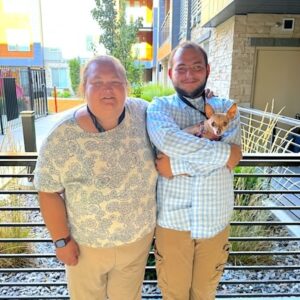A Chance to Be an Advocate for Her Son

Rebecca, a Utah resident, lovingly describes her autistic son, Austin, who is on the cusp of turning 21. “Austin loves animals, especially dogs. He likes to play football, basketball, and soccer. He likes to go to the gym and work out. He is obsessed with the video game Fortnight. He has a girlfriend, and he spends a lot of time with her.” However, Rebecca shares mixed feelings as Austin approaches his 21st birthday. This is the age that many parents of individuals with autism dread. Age 21 is known as “the services cliff.” Individuals no longer are eligible for school-related and state-mandated support, and families are left to fend for themselves with resources and community support.
Despite some positive relationships in his life, Austin does face some challenges that he needs support and understanding with. Like some other autistic adults, Austin struggles with managing emotions and building coping skills. He also has trouble reading social cues, causing social anxiety when around others. However, “having a true friend is what he has most desired all his life,” shares Rebecca.
With these challenges, Rebecca has concerns moving into this new stage of life with Austin. Their family has already faced some barriers in community support. “Austin has had a rough history with his living situations. . . It’s been very difficult to find the right placement for him. This has caused a lot of stress.” She also describes how Austin lost his disability support for 2 years. They struggled to get it back. He’s also faced challenges with finding work. This barrier has been a source of added stress for him and his family as financial strain pulls at them. In addition, many community exchanges with Austin have been negative, especially with health professionals.
However this past year, Rebecca heard about new community-run regional working groups in Utah. They focus on building more autism-friendly communities. These groups are part of the Autism After 21 Utah Project through Madison House Autism Foundation and partners across Utah. They bring together autistic self-advocates, family members, service providers, and community leaders to create local change. “I saw an opportunity to be able to advocate for people with autism and hopefully be part of the solution. I also had hopes that this would be an avenue for my son to find his own voice and maybe even make some friends in the process. It has been a really positive experience so far.”
Their group in Salt Lake County already has plans in progress. They are working on creating more autism-friendly social events, addressing transportation issues, and more. With self-advocates and family members involved in the process, they can address local issues that are meaningful to them. The process empowers these voices that are often sidelined. Rebecca shares that “each person with autism has different needs and supports. . . the one thing they do have in common is the right to be seen, heard, and included in their community as they desire.”
A Note About Language: We do our best to reflect the varied individual preferences of adults on the autism spectrum. We flip between identity-first and person-first language to reflect the diversity of preferences in the community.

 Meet Adam: A Voice for Change
Meet Adam: A Voice for Change


